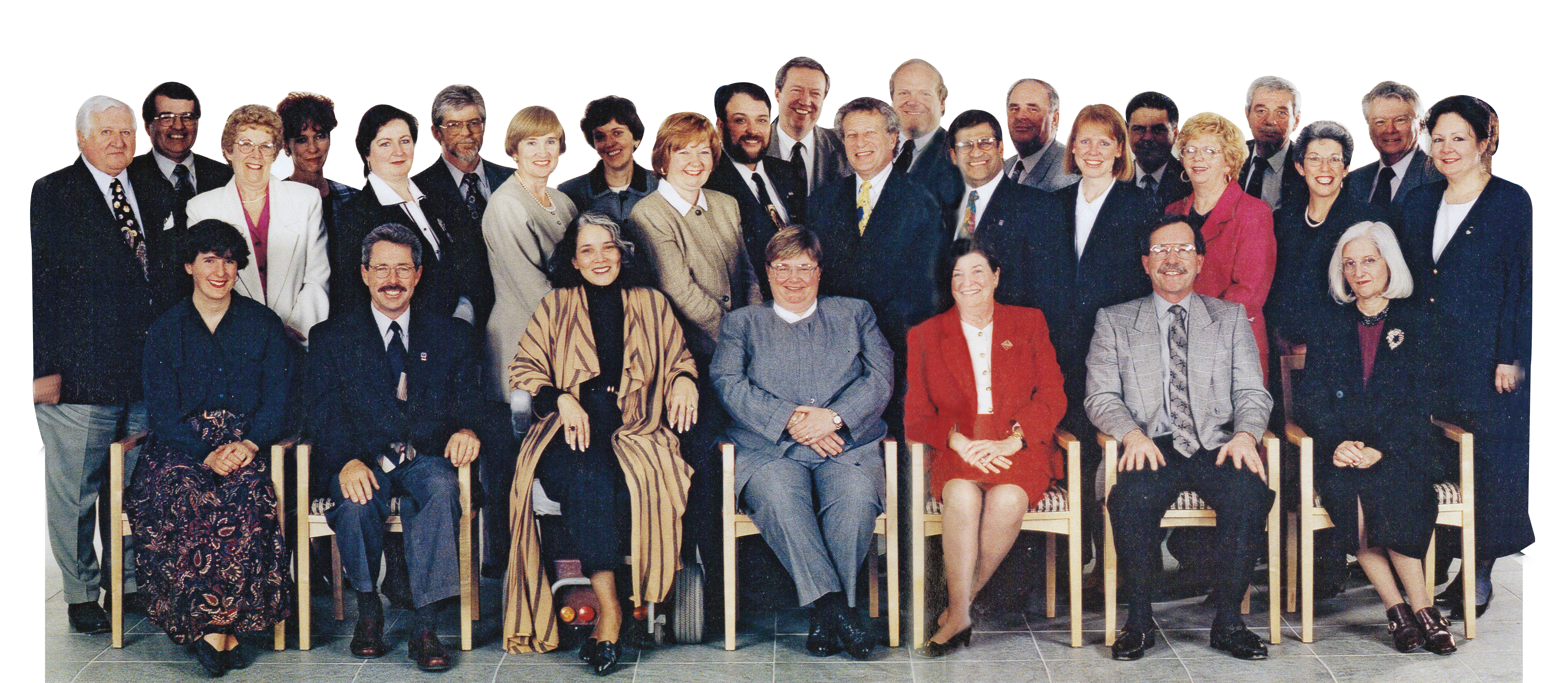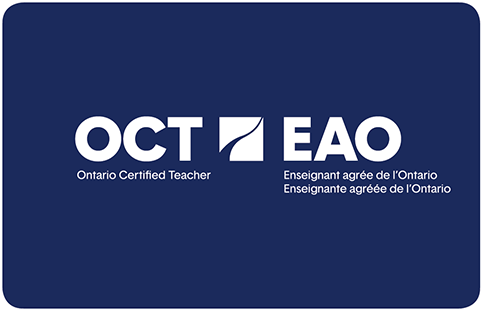Share this page
This section provides updates on licensing and qualification requirements, notification of Council resolutions and reports from various Council committees, including reports on accreditation and discipline matters.
In October, the College welcomed new legislation that further recognizes teacher professionalism and provides fairer practices for the profession, including entrenching the term Ontario Certified Teacher (OCT) in legislation. Other changes enhance operational efficiencies of the College, and support the fairer use of the OCT designation when Ontario Certified Teachers are not actively teaching.
The provincial government announced its plans in Bill 13, the Supporting People and Businesses Act.
The proposed legislation closes a gap in recognizing teacher professionalism. Like engineers and accountants who also have professional designations (P.Eng. and CPA), teachers are highly educated and trained professionals. While "OCT" was trademarked in 2009, it's now written into legislation, ensuring that only those who meet the province's high standards for great teaching can use the OCT designation.
Proposed legislative amendments provide for fairer treatment of members by making membership statuses clearer on the public register. For retired members and those who have been suspended for non-payment of fees, a new membership status, "inactive/non-practising" will be used to denote their status. This replaces the term "suspended," which carried a stigma as it was often associated with disciplinary matters.
The College Registrar will have the authority to appoint individuals to the Deputy Registrar position. This supports effective governance practices and ensures there is proper operational support and clarity of roles.
Together, these new and critical changes support fairness, elevate teacher professionalism and remove outdated administrative processes.
We asked, and members of both the teaching profession and the public answered, in unprecedented numbers.
From August 16 to September 30, the College invited applications from dedicated and qualified individuals interested in serving on Council, committees and rosters. During that time, 648 Ontario Certified Teachers (OCTs) and members of the public submitted applications expressing their interest in helping govern the teaching profession in the province and supporting the well-being of more than two million students.
That's a significantly higher number than the 69 eligible nominees for the College's 2018 Council election.
The recruitment is a part of the College's legislated transition to a new governance structure.
More than 100 individuals will serve in diverse roles on Council, committees or rosters.
Bill 13, introduced earlier this year, included legislative amendments to further streamline College operations, enabling it to operate more effectively and efficiently. Changes include:
The College thanks all who applied for roles on Council, committees and rosters.
"Competency-based selection is an improvement over election-based selection for assembling the Council, committees and rosters."
The 2021 Annual Meeting of Members, held virtually for the second consecutive year, featured some veteran assistance to help explain the benefits of the College's new governance model that takes effect next year.
To guide attendees through the College's ongoing modernization, Deputy Registrar Chantal Bélisle, OCT, moderated a panel of regulatory experts who discussed the benefits of a new structure that provides equal balance between members of the public and members of the profession across Council, committees and rosters.
David Brown, executive vice-president, Governance Solutions Inc., positioned the College's new structure as in line with an emerging global trend known as right-touch regulation, defined by the United Kingdom's Professional Standards Authority as "based on a proper evaluation of risk … proportionate and outcome focused; it creates a framework in which professionalism can flourish and organisations can be excellent."
"Self-regulation is a privilege," Brown said. "And we want to make sure it's a privilege that's earned."
All panellists agreed that while competency-based selection is an improvement over election-based selection for assembling the Council, committees and rosters that will govern the College, supporting these individuals as they grow into their new roles is critical to their success.
André Gariépy, Commissioner for Admission to Professions, Office of the Professions, Government of Québec, suggested such support would "harmonize" the expertise and lived experiences that the public and the profession each contribute to their roles to create a new governance culture within a streamlined structure.
Following the panel discussion Paul Boniferro, the College's Transition Supervisory Officer (TSO), began with a note of gratitude for Ontario Certified Teachers (OCTs) and the professionalism they again displayed through another year of pandemic-related disruption.
"Thank you for your adaptability, your resilience and your dedication," he said. "Thank you for helping to ensure the education needs of Ontario's students continue to be met."
Boniferro then spoke about recent legislative changes designed to facilitate the transition and strengthen the profession, including stronger regulations against acts of hatred or discrimination and stronger penalties for professional misconduct related to sexual abuse and child pornography.
Following the TSO's remarks, the College's Registrar and CEO, Dr. Derek Haime, OCT, provided an update on upcoming resources that will support OCTs in their work to make learning spaces even more inclusive for students of all backgrounds, including new Additional Qualification guidelines and an accompanying professional advisory on anti-Black racism.
The Registrar concluded by echoing the TSO's appreciation for what OCTs accomplished during another challenging year.
"Your professionalism and dedication ensured that the students of Ontario could continue to focus on learning, even as they faced many challenges themselves," he said.
"It's a profession that is strengthened when we put students first, and it is my commitment to you that I will always do exactly that."
In 2022 the College will celebrate 25 years of protecting the public interest. Here is a timeline of pivotal points in the College's history.

The Royal Commission on Learning releases its landmark report For the Love of Learning, leading to the College's establishment.

First College Council
College develops the Standards of Practice for the Teaching Profession and the Ethical Standards for the Teaching Profession.

College issues its first advisory to members, Professional Advisory on Professional Misconduct Related to Sexual Abuse and Sexual Misconduct, and publishes the first Transition to Teaching report, an annual survey of the employment market for new teachers.

College members receive the Ontario Certified Teacher professional designation.

College releases an independent report from Ontario's former Chief Justice Patrick LeSage to review its discipline policies and practices. (All 49 recommendations were adopted.)

College develops the Teaching LGBTQ Students Additional Qualification, the first of its kind in North America.
The provincial government passes Bill 37, the Protecting Students Act, bringing changes into law to better protect students.

College intervenes at the Supreme Court of Canada to provide its perspective on student privacy and what constitutes acceptable professional conduct for teachers.
College commissions independent review of its governance structure and processes.
A policy to adopt gender-inclusive language is implemented across the organization.

The passage of the Safe and Supportive Classrooms Act strengthens the College's ability to protect students from sexual abuse by teachers.

College issues video-conferencing guidelines to help teachers transition from in-class to online teaching during the COVID-19 pandemic.
College announces the development of guidelines for an AQ on anti-Black racism. Racism and discriminatory acts become recognized as a form of professional misconduct.
Legislative amendments enable College to further safeguard students through a proactive sexual abuse prevention program and to begin a corporate governance restructuring to enhance efficiencies.
College introduces a therapy and counselling program for students who have been sexually abused by teachers.

New legislation recognizes teacher professionalism by entrenching the title Ontario Certified Teacher (OCT) in legislation and reduces the size of the incoming Council to a nimbler six members of the profession and six members of the public.
College begins a one-year transition to a new governance structure.
College releases Professional Advisory on Anti-Black Racism to help OCTs address anti-Black racism in learning environments.
The College Scholarship Program recognizes and supports excellence in teacher education. This is done by awarding four annual scholarships to assist in the education of future teachers.
photos: (mikayla) Matthew Bornais, (anthonia) Jaizmond Photo; (joshua) Tess Bardikoff; (rachel) Andrew Macartney

Mikayla Bornais, teacher candidate in the concurrent education program at the University of Windsor.
Engaged, positive, highly motivated, tenacious, Mikayla Bornais is known as being a standup person with a genuine interest in the world. Deeply passionate about teaching youth, she is described as having a wonderful character and approaches tasks with strong analytical skills.
Throughout her studies, Bornais worked as a swim instructor where she taught children of all ages, including some with disabilities. She did supply teaching in Ontario's English and French boards and was involved in an after-school program at École élémentaire catholique Sainte-Marguerite-d'Youville in Tecumseh, Ont., where she assisted children with school work.
Bornais also volunteered in the program Let's Talk Science at the University of Windsor, where she presented engaging scientific activities to students in the community. Her research work was published in the journal Animal Behaviour, and she was the recipient of university awards for her outstanding research skills.
Bornais wants to empower students who face challenges, whether these be socio-economic, discrimination due to race, gender, disability or language.

Anthonia Ikemeh, teacher candidate in the consecutive education program at the Ontario Institute for Studies in Education/University of Toronto (OISE/UT).
As an early childhood educator (ECE), Anthonia Ikemeh already has the qualities she needs for her next move in teaching: strong communication and problem-solving skills, active listening, accountability and a sense of humour. Those around her say that she is compassionate, and that students' well-being is at the core of her learning and research.
Ikemeh worked for six years as an ECE with the Toronto Catholic District School Board while taking evening classes to complete her undergraduate degree in child development. In that role, she was described as constantly looking for ways to challenge students and help them grow through play-based learning, while supporting them as they develop socially, emotionally and cognitively.
Ikemeh created lesson plans that connected students' learning to real-world issues. For example, she used the book The Water Walker by Joanne Robertson to connect it to the clean water crisis impacting Indigenous communities in Canada. She also helped create a monthly program called Parents at Play — featured in the Toronto Star — where parents came to the classroom to play and learn with their children.
The teacher candidate is looking forward to continuing her engagement in projects that promote diversity and equity of all people, especially marginalized groups such as Black, Indigenous and Peoples of Color (BIPOC).

Joshua Mogyoros, teacher candidate in the consecutive education program at the Ontario Institute for Studies in Education/University of Toronto (OISE/UT).
Joshua Mogyoros was doing his graduate studies in physics at the University of Guelph when he realized he was more interested in being a teaching assistant than researching his thesis. He followed a wandering career path that led him to working as a design lab technologist at a Toronto independent school and inspired him to dedicate his career to teaching.
For this physics researcher, being comfortable with making mistakes is part of the learning process — and speaking openly about it is part of his teaching philosophy. He enjoys teaching students how to develop critical reasoning skills by teaching them how to think for themselves.
Mogyoros is described as having an impressive combination of talents: bright, motivated, logical, and is a highly skilled communicator who brings creativity and enthusiasm to his interactions with students.

Rachel Stymiest, teacher candidate in the consecutive education program at Queen's University.
"Stymiest knows that by becoming a teacher, she will be able to support and inspire children's resiliency …"
One thing is clear about Rachel Stymiest: as a BIPOC female who has overcome significant challenges throughout her life, she has found a passion for education and mental health that will serve her well in her teaching career. She has demonstrated resiliency through her hard work, focus and tact, all of which have pushed her to always strive for a better outcome.
During her undergraduate studies at the University of Waterloo, Stymiest spent a semester interning at an elementary school where she made a special connection with the diverse student population. Stymiest holds an Honours bachelor of arts in peace and conflict studies with minors in psychology and legal studies. Her knowledge in topic areas such as conflict resolution, cross-cultural practices, mediation, immigration and refugee status, psychology, and legal studies allows her to put theory into practice when she teaches students from a wide range of backgrounds.
Her natural ability to connect and empathize with students is clear in the genuine connections she builds along with her quiet authority. Stymiest knows the importance of caring relationships from her first-hand experiences facing adversity and being aware of the lack of BIPOC representation in teachers, both when she was in school and now as a teacher candidate.
Noting the deeper connection she made with students who related to her racial identity or were ecstatic to see she wore her hair in box braids, a protective hairstyle among the Black community, Stymiest saw the critical importance of increasing BIPOC representation in education.
Stymiest knows that by becoming a teacher, she will be able to support and inspire children's resiliency, advocacy and compassion in a variety of capacities. She hopes to use her life experience, social position, academic background and calming demeanour to help her students develop their ability to respond positively to challenges, find their voices, and pass on their learning to others in need as she strives to model herself.